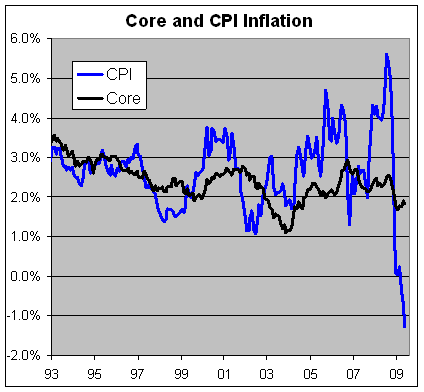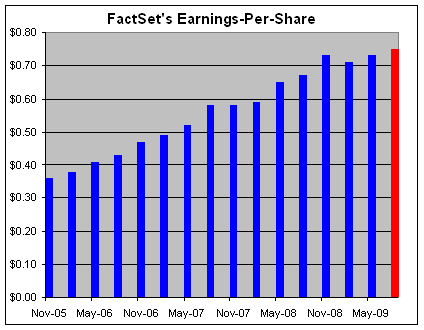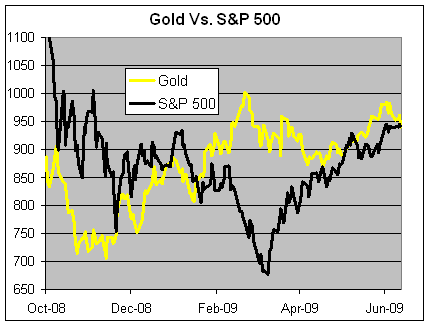Archive for June, 2009
-
CPI Came in Below Forecast
Eddy Elfenbein, June 17th, 2009 at 9:19 amBoth headline and core were up 0.1%:
The cost of living in the U.S. rose less than forecast in May, culminating in the biggest 12-month drop in prices in almost 60 years.
The consumer price index increased 0.1 percent after no change a month earlier, the Labor Department said today in Washington. In the 12 months ended in May, costs dropped 1.3 percent, the biggest decline since 1950.
Higher commodity prices, including gasoline, will probably restrain Americans’ discretionary spending at a time when the economy is showing signs of stabilizing. The lack of sustained gains in sales is one reason companies are finding it difficult to pass increasing costs on to customers.
-
People With Way Too Much Time on Their Hands
Eddy Elfenbein, June 17th, 2009 at 8:55 am -
Swan Song
Eddy Elfenbein, June 16th, 2009 at 3:17 pmMark Gimein looks at Nassim Taleb:
But the failures of the Niederhoffers and AIGs do not translate to a validation of Taleb-style catastrophism because these two approaches turn out to be linked. They are mirror images. In noncatastrophic times, the Niederhoffers and AIGs make money consistently and quietly and then end up losing it conspicuously and painfully. The Talebs make money rarely, amaze everyone because they do it when everybody else is getting killed—and so make it easy to forget about years of steady losses. Over the long run, the anti-catastrophists often do fairly well (if they don’t get too greedy and make bets that cost them all their money in even a small market drop). But it is the catastrophists, a la Taleb, who look smarter. If you’re always planning for crisis, you look like a genius when it does come.
Arguing against Taleb is a little embarrassing; who among us wants to side with the plodders when for the price of a paperback you can join the elect? But the experience of the markets here is important because it shows that neither consistently discounting the chance of unforeseen risks, as AIG did with such gusto, nor betting day after day on unforeseen catastrophes is a reliable way to make money.
In his books Taleb presents a wealth of examples of how prone we are to discount the unexpected and unlikely, but what is notably missing from The Black Swan are examples of just how likely we are to overestimate the chances of unlikely events when they are presented to us under a spotlight. Taleb is, of course, right that we fail to anticipate what we are not looking for. But we also overanticipate when we are looking too hard for the outliers. Lottery players overvalue their chances of winning $10 million, and horse bettors put too much money on 100-1 long shots. People who watch the local news too avidly believe there is a child kidnapper around every corner, and followers of Taleb assume that every time they pass a dark alley, catastrophe is about to pop out with a bloody knife. -
FactSet Beats the Street
Eddy Elfenbein, June 16th, 2009 at 12:01 pmOne of my Buy List stocks, FactSet Research Systems (FDS), just reported another strong quarter. For the May quarter, which is their fiscal third quarter, FactSet earned 73 cents a share which was a penny better than estimates. Revenues rose 4.7% to $154.4 million which was slightly below the Street’s consensus.
For Q4, FDS sees earnings coming in between 73 cents and 75 cents a share, and revenues between $152 and 157 million. The Street was expecting 72 cents on $155.45 million.
FactSet said its operating margins and free cash flow rose even though they lost 34 clients last quarter. Client count is now at 2,033. The company also recently raised its quarterly dividend to 20 cents a share from 18 cents. This is an excellent stock to own.
Here’s a look at FDS’ recent quarterly results with the red bar being my forecast for this quarter.

-
Naked Shorting Is a Phoney Problem
Eddy Elfenbein, June 16th, 2009 at 10:16 amJohn Hempton has an outstanding post on the government’s absurd war on naked short-selling. He says that it’s costing taxpayers one billion dollars.
It’s a long post; here’s a sample:The story was that selling stock you did not own was producing “counterfeit shares”. I have yet to see mischievous naked short selling of any real business – though I have seen some fails-to-deliver (that is not actually being able to borrow the stock on the delivery date) remedied a few days later and with all obligations to the exchange cash collateralised over the interim period. There were plenty of “fails” but no real naked short selling “problem”. Hard to borrow stocks did fail regularly – but I assure you – and I have been doing this for years – when there were fails to deliver my broker called my short back and hey – presto – a few days later I had settled. If there was a “counterfeit share” it was cash collateralised and it was cancelled a few days later (in exchange for the cash collateral). The person who purchased the share from me got all the economic benefit of owning that share – and a full voting share was delivered to them within a modest time.
Fails to deliver now are – with electronic settlement – a far lesser and far quicker remedied problem than they were in the days of paper certificates. And with the speed at which they are settled – and the ability to demand cash collateral when a party fails to deliver they cause no economic problem at all.The SEC has now forced shorts to find a borrow before you can actually short the stock. Hempton points out the harm in this in the case of Citigroup. You can buy Citigroup at an 18% discount by buying the preferred. So there’s an arb play; long the preferred, short the common.
Well, now you can’t do that with certainty. If you short Citi, you might be forced to buy it back at a higher price. As John points out, who is Citi’s largest shareholder? Taxpayers.So – in pursuing the bogus issue of naked short selling not only has the SEC diverted resources from its real job (which is chasing the real crims in the financial market such as Madoff) but it has imposed significant and real costs on the taxpayer and made it harder and more expensive for banks to raise capital in a financial crisis.
But – I should not complain. It has put a reasonable risk arbitrage our way – and I hope to report back that – thanks to the SEC crackdown on a bogus issue our clients are just that little bit richer.
Nonetheless I will know a commentator who really gets it when they defend modest levels of cash collateralised fails to deliver as a normal part of a normally functioning financial market. Naked short selling is good for markets, good for taxpayers and good for capitalism. -
PPI Rose Less than Forecast
Eddy Elfenbein, June 16th, 2009 at 9:10 amPrices paid to U.S. producers rose less than forecast in May as food expenses dropped, leading to the biggest 12-month slump in wholesale costs in a half century.
The 0.2 percent increase in prices paid to factories, farmers and other producers followed a 0.3 percent gain in April, the Labor Department said today in Washington. Excluding food and fuel, so-called core prices unexpectedly fell.
The lack of sustained gains in sales is one reason companies will need to keep a lid on prices, preventing inflation from flaring. The rising cost of commodities such as gasoline may further limit consumers’ discretionary spending at a time when the economy is showing signs of stabilizing.
“Outside of oil, inflation is still tame,” James O’Sullivan, a senior economist at UBS Securities LLC in Stamford, Connecticut, said before the report. “Given the huge amount of slack in the economy, the broad trend in inflation is more likely to be down than up.”
Economists forecast producer prices would rise 0.6 percent, according to the median of 73 projections in a Bloomberg News survey. Estimates ranged from no change to a 2.3 percent gain.
Compared with a year earlier, companies paid 5 percent less for goods, the biggest decrease since 1949 and reflecting the drop in fuel costs late last year that has since partially reversed.Meanwhile, Job title inflation reaches alarming levels.
-
Morning Call
Eddy Elfenbein, June 16th, 2009 at 8:56 amDetroit now has zero bookstore chains, zero national grocery chains, zero Chrysler Jeep dealers and only four Starbucks.
G.M. Sells Saab to Swedish Automaker
Smithfield swings to loss but bests estimates
European car sales sink 4.9% in May
Volvo says demand has bottomed out
Best Buy posts lower quarterly profit, keeps view
China to Pass Germany as Porsche’s Second-Biggest Market. Apparently, there is a substitute.
One of the world’s largest dairy farms is in…Saudi Arabia? -
Captain America Redux
Eddy Elfenbein, June 15th, 2009 at 11:42 pmThe New York Times reports that Marvel Entertainment (MVL) is bringing back Captain America:
More than two years after his comic book death, the sentinel of liberty known as Captain America is returning to the land of the living. “Captain America Reborn,” a five-part series published by Marvel Entertainment, will begin next month and is written by Ed Brubaker and illustrated by Bryan Hitch, one of the comic book industry’s most acclaimed artists. Mr. Brubaker is the regular writer of the Captain America series, including issue No. 25, published in 2007, in which the title hero was felled by an assassin’s bullet. It was a shot heard around the world as many news organizations carried word of the captain’s death. The story of his return begins in Captain America No. 600 (the series is returning to the original numbering from Volume 1, with a cover date of March 1941), which is in comic book stores now. New comics typically go on sale Wednesdays, but in an unusual move Marvel has allowed the comic to go on sale immediately.
Conan O’Brien said they’ll start making Captain America once they get a loan from Captain China.
-
Stunning Pictures from Iran
Eddy Elfenbein, June 15th, 2009 at 5:15 pmThe Iranian military raided Isfahan University of Technology (warnings graph images).
-
S&P 500 and Gold Are the Same
Eddy Elfenbein, June 12th, 2009 at 1:06 pmGold and the S&P 500 are basically neck and neck today.

-
-
Archives
- April 2025
- March 2025
- February 2025
- January 2025
- December 2024
- November 2024
- October 2024
- September 2024
- August 2024
- July 2024
- June 2024
- May 2024
- April 2024
- March 2024
- February 2024
- January 2024
- December 2023
- November 2023
- October 2023
- September 2023
- August 2023
- July 2023
- June 2023
- May 2023
- April 2023
- March 2023
- February 2023
- January 2023
- December 2022
- November 2022
- October 2022
- September 2022
- August 2022
- July 2022
- June 2022
- May 2022
- April 2022
- March 2022
- February 2022
- January 2022
- December 2021
- November 2021
- October 2021
- September 2021
- August 2021
- July 2021
- June 2021
- May 2021
- April 2021
- March 2021
- February 2021
- January 2021
- December 2020
- November 2020
- October 2020
- September 2020
- August 2020
- July 2020
- June 2020
- May 2020
- April 2020
- March 2020
- February 2020
- January 2020
- December 2019
- November 2019
- October 2019
- September 2019
- August 2019
- July 2019
- June 2019
- May 2019
- April 2019
- March 2019
- February 2019
- January 2019
- December 2018
- November 2018
- October 2018
- September 2018
- August 2018
- July 2018
- June 2018
- May 2018
- April 2018
- March 2018
- February 2018
- January 2018
- December 2017
- November 2017
- October 2017
- September 2017
- August 2017
- July 2017
- June 2017
- May 2017
- April 2017
- March 2017
- February 2017
- January 2017
- December 2016
- November 2016
- October 2016
- September 2016
- August 2016
- July 2016
- June 2016
- May 2016
- April 2016
- March 2016
- February 2016
- January 2016
- December 2015
- November 2015
- October 2015
- September 2015
- August 2015
- July 2015
- June 2015
- May 2015
- April 2015
- March 2015
- February 2015
- January 2015
- December 2014
- November 2014
- October 2014
- September 2014
- August 2014
- July 2014
- June 2014
- May 2014
- April 2014
- March 2014
- February 2014
- January 2014
- December 2013
- November 2013
- October 2013
- September 2013
- August 2013
- July 2013
- June 2013
- May 2013
- April 2013
- March 2013
- February 2013
- January 2013
- December 2012
- November 2012
- October 2012
- September 2012
- August 2012
- July 2012
- June 2012
- May 2012
- April 2012
- March 2012
- February 2012
- January 2012
- December 2011
- November 2011
- October 2011
- September 2011
- August 2011
- July 2011
- June 2011
- May 2011
- April 2011
- March 2011
- February 2011
- January 2011
- December 2010
- November 2010
- October 2010
- September 2010
- August 2010
- July 2010
- June 2010
- May 2010
- April 2010
- March 2010
- February 2010
- January 2010
- December 2009
- November 2009
- October 2009
- September 2009
- August 2009
- July 2009
- June 2009
- May 2009
- April 2009
- March 2009
- February 2009
- January 2009
- December 2008
- November 2008
- October 2008
- September 2008
- August 2008
- July 2008
- June 2008
- May 2008
- April 2008
- March 2008
- February 2008
- January 2008
- December 2007
- November 2007
- October 2007
- September 2007
- August 2007
- July 2007
- June 2007
- May 2007
- April 2007
- March 2007
- February 2007
- January 2007
- December 2006
- November 2006
- October 2006
- September 2006
- August 2006
- July 2006
- June 2006
- May 2006
- April 2006
- March 2006
- February 2006
- January 2006
- December 2005
- November 2005
- October 2005
- September 2005
- August 2005
- July 2005
 Eddy Elfenbein is a Washington, DC-based speaker, portfolio manager and editor of the blog Crossing Wall Street. His
Eddy Elfenbein is a Washington, DC-based speaker, portfolio manager and editor of the blog Crossing Wall Street. His